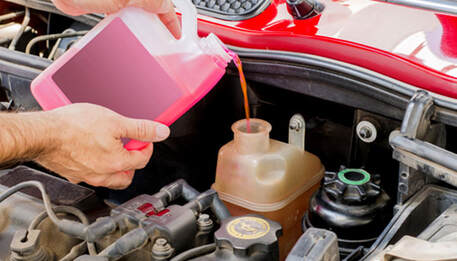Part 3 - The Ugly By P Sanchez If fixing cars was like treating people, mechanics will be analogous to doctors, auto repair shops comparable to hospitals, and medical treatments like replacing a hip-joint, a face-lift and an open-heart surgery will be much like a lower arm ball-joint replacement, body panel repaint, and an engine rebuild respectively. Diagnosis is close to exact as they can be, while treatments are proven best, direct, methodical, might be invasive at times but success rates are pretty good. But we’re not here to talk about the cost-effectiveness of transmission replacement nor are we discussing the latest dealer-grade OBD scan tools capable of the most advanced bi-directional testing of our increasingly hi-tech vehicles. We’re here to talk about the herbal capsules and health supplements for our hot rods, the latest holistic diets for our daily drivers, the acupuncture and alternative medicine for our automobiles. We’re talking about car care solutions that conveniently come in a bottle. In our two previous blog installments, we’ve talked about a few good products that largely do what they claim to do, and a few iffy ones that, at best, vary in mileage, and at worst are unnecessary and are a complete waste of your money. In this last installment we’ll discuss what experts believe are the worst of the lot: products that claim to fix a problem but can actually do more harm to your car. Let’s dive in!
The Ugly Leaks are a certain thing when a car ages, there are no ifs and buts about it. One automobile sub-system that’s often first to spring a leak is the air-conditioning. The refrigerant in AC systems is always under pressure and half the time in the form of a gas, and so it’s easy for the fluid to escape into the atmosphere through microscopic pores and fissures that can develop along the AC’s tubes, seals and components. AC technicians find culprit leaks by injecting systems with UV dyes. The dye glows under special lighting revealing the leak which the technician can patch-up or replaces the defective part. But a few companies have the idea of employing internal sealants. Much like a tire sealant, the AC sealant is injected in the AC system and patches the leak from the inside. The product looks good on paper. But unfortunately, these products do not take into account constriction points in the AC system that are necessary for normal operation, like in the expansion valve and compressor’s internals as well as the risk of contaminating the dryer. So the sealant ends up clogging the system and destroying the AC altogether. Because if this, many mechanics are wary of this type of product. Boob Lube It’s one thing for a product to claim benefits but does nothing to an engine, it’s another thing that does more harm than good and that’s the case with putting the right lubricant in your engine. As previously mentioned, most modern gasoline engines are particular to the viscosity of the oil you put in them. Most run thinner oils for efficiency purposes as thicker grade oil is difficult to circulate especially at lower operating temperatures. In some variable valve engine, like the venerable VTEC of Honda, the different cam configurations are engaged using a system of hydraulics that depends on thin running oil. Intending to address oil leaks using higher viscosity oil or adding additives that coat metal surfaces may result in clogging of those narrow hydraulic pathways and eventually damage the engine. It’s safest to go with OEM recommendations. If you want to gamble, check all available information on a certain product (label, literature, manufacturer’s website, forums) and see if the product has been proven compatible specifically for your vehicle’s engine. Hold off on any product with sweeping statements like “works on all modern engines.” And lastly, check with a qualified mechanic if a particular OEM “similar” product is advisable. If there’s one vehicle part that’s really finicky about its lube (even more than the engine), it’s the automatic transmission. Because in an automatic transmission, automatic transmission fluid (ATF) does more than lubricate. It also performs hydraulic functions (like in the torque converter), cooling functions, and almost counter-intuitively: allows for a certain amount of friction. An automatic transmission engages different gearing combinations by engaging-and-disengaging clutch packs. Each tranny design uses clutch materials with specific surface friction coefficients, kind of like the grit number of sandpaper. Engineers have designed these clutches to work with a specific ATF formulation. The wrong ATF can either cause slippage with too little friction or premature breakdown of the clutch material with too much friction. Use exactly what’s OEM recommended (again, check your manual) and think twice about putting in additives as a preventive measure as these can often do more harm than good. In Closing When it comes to keeping your body healthy, there are really no short-cuts: it’s all about diet, exercise, living a clean lifestyle and regular visits to your doctor. It’s pretty much the same for your car. Driving conservatively, following your manual’s recommendations – including sticking to the maintenance schedule and using only products with OEM specifications, and taking your car to a reputable car repair service are the best means to prolong the service life of your car. Do you agree or disagree with our information? Let us know by leaving comments below.
1 Comment
|
AuthorSmith's Auto Repair serves Dayton, Ohio and the surrounding communities using digital inspection service for all its customers ArchivesCategories |
 RSS Feed
RSS Feed